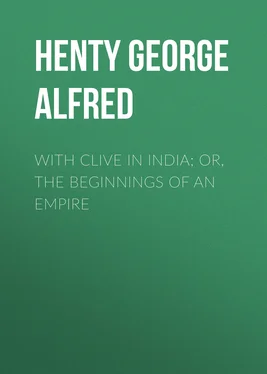George Henty - With Clive in India; Or, The Beginnings of an Empire
Здесь есть возможность читать онлайн «George Henty - With Clive in India; Or, The Beginnings of an Empire» — ознакомительный отрывок электронной книги совершенно бесплатно, а после прочтения отрывка купить полную версию. В некоторых случаях можно слушать аудио, скачать через торрент в формате fb2 и присутствует краткое содержание. Жанр: foreign_children, foreign_antique, foreign_prose, prose_military, на английском языке. Описание произведения, (предисловие) а так же отзывы посетителей доступны на портале библиотеки ЛибКат.
- Название:With Clive in India; Or, The Beginnings of an Empire
- Автор:
- Жанр:
- Год:неизвестен
- ISBN:нет данных
- Рейтинг книги:5 / 5. Голосов: 1
-
Избранное:Добавить в избранное
- Отзывы:
-
Ваша оценка:
- 100
- 1
- 2
- 3
- 4
- 5
With Clive in India; Or, The Beginnings of an Empire: краткое содержание, описание и аннотация
Предлагаем к чтению аннотацию, описание, краткое содержание или предисловие (зависит от того, что написал сам автор книги «With Clive in India; Or, The Beginnings of an Empire»). Если вы не нашли необходимую информацию о книге — напишите в комментариях, мы постараемся отыскать её.
With Clive in India; Or, The Beginnings of an Empire — читать онлайн ознакомительный отрывок
Ниже представлен текст книги, разбитый по страницам. Система сохранения места последней прочитанной страницы, позволяет с удобством читать онлайн бесплатно книгу «With Clive in India; Or, The Beginnings of an Empire», без необходимости каждый раз заново искать на чём Вы остановились. Поставьте закладку, и сможете в любой момент перейти на страницу, на которой закончили чтение.
Интервал:
Закладка:
Chapter 6: The Arrival Of Clive
"I have nearly brought down the story to the present time," Mr. Johnson said. "One event has taken place, however, which was of importance. Muzaffar Jung set out for Hyderabad, accompanied by a French contingent under Bussy. On the way, the chiefs who had conspired against Nazir Jung mutinied against his successor. Muzaffar charged them with his cavalry. Two of the three chief conspirators were killed and, while pursuing the third, Muzaffar was himself killed.
"Bussy at once released from confinement a son of Nazir Jung, proclaimed him Subadar of the Deccan, escorted him to Hyderabad, and received from him the cession of considerable fresh grants of territory to the French. The latter were now everywhere triumphant, and Trichinopoli and Tanjore were, with the three towns held by the English, the sole places which resisted their authority. Muhammud Ali, deeming further resistance hopeless, had already opened negotiations with Dupleix for the surrender of Trichinopoli. Dupleix agreed to his conditions; but when Muhammud Ali found that Count Bussy, with the flower of the French force, had been despatched to Hyderabad, he gained time by raising fresh demands, which would require the ratification of the subadar.
"Luckily for us Mr. Floyer had been recalled, and his place taken by Mr. Saunders; who is, everyone says, a man of common sense and determination. Muhammud Ali urged upon him the necessity for the English to make common cause with him against the enemy, for if Trichinopoli fell, it would be absolutely impossible for the English to resist the French and their allies. Early this year, then, Mr. Saunders assured him that he should be assisted with all our strength, and Muhammud Ali thereupon broke off the negotiations with the French.
"Most unfortunately for us, Major Lawrence had gone home to England on sick leave. Captain Gingen, who now commands our troops, is a wretched substitute for him. Captain Cope is no better.
"Early this year Mr. Saunders sent Cope, with two hundred and eighty English and three hundred Sepoys, to Trichinopoli. Benefiting by the delay which was caused before Dupleix, owing to the absence of his best troops at Hyderabad, could collect an army, Cope laid siege to Madura, but was defeated and had to abandon his guns. Three thousand of Muhammud Ali's native troops thereupon deserted to the enemy.
"The cause of the English now appeared lost. Dupleix planted the white flags, emblems of the authority of France, in the fields within sight of Fort Saint David. With immense efforts, Mr. Saunders put into the field five hundred English troops, a thousand Sepoys, a hundred Africans, and eight guns; under the command of Captain Gingen, whose orders were to follow the movements of the army with which D'Auteuil and Chunda Sahib were marching against Trichinopoli.
"Luckily Chunda Sahib, instead of doing so at once, moved northwards to confirm his authority in the towns of North and South Arcot, and to raise additional levies. Great delay was caused by this. On arriving before the important fortress of Valkonda, Chunda Sahib found before it the troops of Captain Gingen, who had been reinforced by sixteen hundred troops from Trichinopoli. The governor of the place, not knowing which party was the stronger, refused to yield to either; and for a fortnight the armies lay at a short distance from each other, near the fortress, with whose governor both continued their negotiations.
"Gingen then lost patience and attacked the place, but was repulsed, and the governor at once admitted the French within the fortress. The next day the main body of the French attacked us, the guns of the fortress opening fire upon us at the same time. Our men, a great portion of whom were recruits just joined from England, fell into a panic and bolted, abandoning their allies and leaving their guns, ammunition, and stores in the hands of the enemy.
"Luckily, D'Auteuil was laid up with gout. If he had pressed on, there remained only the two or three hundred men under Cope to offer the slightest resistance. Trichinopoli must have fallen at once; and we, without a hundred soldiers here, should have had nothing to do but pack up and go. As it was, Gingen's beaten men were allowed to retreat quietly towards Trichinopoli.
"The next day D'Auteuil was better, and followed in pursuit, and Gingen had the greatest difficulty in reaching Trichinopoli. There, at the present moment, we lie shut up, a portion of our force only remaining outside the walls.
"The place itself is strong. The town lies round a lofty rock, on which stands the fortress, which commands the country for some distance round. Still, there is no question that the French could take it, if they attacked it. Our men are utterly dispirited with defeat. Cope and Gingen have neither enterprise nor talent.
"At present the enemy, who are now under the command of Colonel Law, who has succeeded D'Auteuil, are contenting themselves with beleaguering the place. But as we have no troops whatever to send to its rescue, and Muhammud Ali has no friends elsewhere to whom to look for aid, it is a matter of absolute certainty that the place must fall, and then Dupleix will only have to request us to leave, and we shall have nothing else to do but to go at once. So I should advise you not to trouble yourself to unpack your luggage, for in all probability another fortnight will see us on board ship.
"There, that's a tremendous long yarn I've been telling you, and not a pleasant one. It's a history of defeat, loss of prestige and position. We have been out fought and out diplomatized, and have made a mess of everything we put our hand to. I should think you must be tired of it. I am. I haven't done so much talking, for years."
Charlie and Peters thanked their new acquaintance, warmly, for the pains he had taken in explaining the various circumstances and events which had led to the present unfortunate position; and Charlie asked, as they stood up to say goodnight to Mr. Johnson, "What has become of Clive, all this time?"
"After the conquest of Devikota," Mr. Johnson said, "the civilians in the service were called back to their posts; but to show that they recognized his services, the authorities allowed Clive to attain the rank of captain, which would have been bestowed upon him had he remained in the military service, and they appointed him commissary to the army, a post which would take him away from the office work he hated. Almost directly afterwards, he got a bad attack of fever, and was forced to take a cruise in the Bay of Bengal. He came back in time to go with Gingen's force; but after the defeat of Valkonda he resigned his office, I suppose in disgust, and returned to Fort Saint David. In July, some of the Company's ships came in with some reinforcements. There were no military officers left at Fort Saint David, so Mr. Pigot, a member of the council, started with a large convoy of stores, escorted by eighty English and three hundred Sepoys. Clive volunteered to accompany them. They had to march thirty or forty miles to Verdachelam, a town close to the frontier of Tanjore, through which the convoy to Trichinopoli would be able to pass unopposed, but the intervening country was hostile to the English.
"However, the convoy passed unmolested, and after seeing it safely to that point, Pigot and Clive set out to return, with an escort of twelve Sepoys. They were at once attacked, and for miles a heavy fire was kept up on them. Seven of the escort were killed, the rest reached Fort Saint David in safety. Pigot's report of Clive's conduct, strengthened by that previously made by Major Lawrence, induced the authorities to transfer him permanently to the army. He received a commission as captain and was sent off, with a small detachment remaining at Saint David's, to Devikota.
"There he placed himself under Captain Clarke, who commanded; and the whole body, numbering altogether a hundred English, fifty Sepoys, with a small field piece, marched up to Trichinopoli, and I hear managed to make its way in safety. He got in about a month ago."
Читать дальшеИнтервал:
Закладка:
Похожие книги на «With Clive in India; Or, The Beginnings of an Empire»
Представляем Вашему вниманию похожие книги на «With Clive in India; Or, The Beginnings of an Empire» списком для выбора. Мы отобрали схожую по названию и смыслу литературу в надежде предоставить читателям больше вариантов отыскать новые, интересные, ещё непрочитанные произведения.
Обсуждение, отзывы о книге «With Clive in India; Or, The Beginnings of an Empire» и просто собственные мнения читателей. Оставьте ваши комментарии, напишите, что Вы думаете о произведении, его смысле или главных героях. Укажите что конкретно понравилось, а что нет, и почему Вы так считаете.












